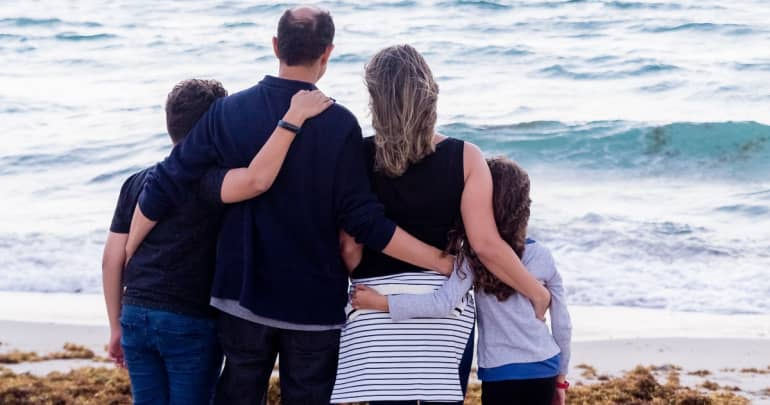Alumni face a challenging transition from their time in detox and residential care to developing their own sober lives outside of a treatment facility. Families play an integral role during this transition. Educating families about the disease, effective supporting techniques, and more are crucial for maintaining a person’s sober lifestyle established throughout recovery. Overcoming addiction is never a journey that an individual must go on alone. The use of family education in conjunction with professional support and care is essential for creating a healthy and effective approach to each person’s continued sobriety.
Addiction as a Family Disease
Navigating addiction can be an incredibly isolating experience, with many of those challenged by the disease feeling alone or misunderstood. This may be due to prevalent stigmas about addiction or worries about the judgment of others. However, addiction never affects an individual truly in isolation, despite how it may feel. Rather, addiction affects entire families, from relationships to home atmospheres and more. Just as addiction is a family disease, effective recovery is equally a familial effort.
Family education plays an essential role in effective recovery and sobriety. Family education is essential for helping those overcoming addiction receive the best and most educated support possible. It is also instrumental in creating a shared sense of understanding when approaching the subject, ensuring that each family member is on the same page going forward.

Helping a loved one with heroin addiction is helping the whole family. It begins with a conversation, and Hawaii Island Recovery can help. Call (866) 390-5070.
More infoIncorporating the Family in Ongoing Recovery
Addiction recovery is not something that is traditionally “completed” but rather something that an individual will have to manage for the rest of their lives. Getting the family involved is a powerful approach to ensuring that effective sober changes are sustained. Meanwhile, utilizing family education and incorporating the family in ongoing recovery is necessary for getting creating a wholly transformed life for all involved.

Some family members may pursue their own therapeutic outlets to overcome the effects of addiction. Fractured relationships, depression, anxiety, resentment, and more commonly affect entire families, with even one member overcoming addiction. However, others may get involved through dedicated family programs, and this approach can be wholly transformative for many throughout recovery.
Families can be amazing supports, providing aid and unconditional love as well as accountability for each person’s actions and accomplishments throughout their recovery journey. There are many ways for the family to get involved, either through dedicated recovery efforts or otherwise, including:
- Participating in dedicated family therapy programs
- Hosting family game nights
- Encouraging regular check-ins to discuss emotional needs or states
- Creating new holiday traditions
- Being educated on signs of stress or triggers
- Learning how to address urges, cravings, or mental health needs
- Encouraging self-care outlets
However, effectively getting the family involved as an alumnus can be tricky. Families must be both involved and educated about the challenges and misconceptions of addiction as it is necessary for healthy family life.
The Value of Family Education for Communication
Communication is crucial throughout all stages of recovery. Communicating with family is just as important for alumni navigating life outside of a dedicated treatment facility or in intensive outpatient care. Reaching a shared understanding of addiction as a disease and the myriad of ways it impacts a person’s mood, mental health, physical health, and more is crucial for beginning the long and important healing process.
Being able to communicate needs and understand why and how these needs are important to a person’s sobriety is necessary to create the most effective approach to support. Likewise, effective communication is the cornerstone of such dialogues. Whether using education to establish a shared lexicon with family to understand the essential terms used in recovery or an active familial communication plan, communication and family education are essential for the best possible support. Continued communication efforts may include attending weekly meetings, having dinner together, or participating in daily phone calls.
Pursuing Therapeutic Outlets
Therapy and addiction recovery are personal journeys, but that doesn’t mean that an individual must embark on them alone. Providing education to families can empower them to best understand and support various therapeutic outlets. It can be difficult for those unfamiliar with the recovery process to understand the importance of new activities, self-care, or the necessary function they provide. Educated families must not only recognize the need for new experiences and therapies but also help find new local outlets and opportunities while encouraging their engagement.

Talking about addiction recovery to your child can be challenging. Engaging in an age-appropriate dialogue will bridge communication gaps. Call (866) 390-5070.
More infoFamily Education for Sustained Sobriety
Families often want to help in any and every way possible to help a loved one overcome the effects of addiction. However, this notion doesn’t always translate to effective support. Family education and treatment programs in Hawaii also help families explore the fickle – if important – line between enabling and supporting.
Support can indeed include providing aid and direct care. However, effective support requires family members to understand when and how to let those in recovery solve their own problems, address their own stresses, and more. Throughout this process, members can know how to hold their loved ones accountable for their actions, whether they be their successes and triumphs or slips throughout recovery.

Lastly, getting engaged in a family therapy program or exploring professional addiction recovery can also allow families to best identify stresses or concerning behaviors to help prevent relapse, all while establishing their own essential barriers. Providing constant, unwavering support is exhausting. Learning to erect effective barriers with loved ones, set expectations, consider their own self-care, and create fair expectations of themselves and others are all key skills to learn throughout the recovery process in the pursuit of effective familial healing from addiction.
Families play an incredible role in continued recovery and sobriety. Ensuring that these families are educated and aware of the challenges that you may face can help them be the most effective supports, all while managing their own health and emotional state. Hawaii Island Recovery offers a comprehensive approach to your sobriety and sober journey, addressing not just your needs in recovery but also how the family can best be involved in our effective treatment programs in Hawaii. From providing outlets for families to explore effective practices to providing necessary education and communication strategies for a sober future, families and recovery are intimately interconnected. For more information on how we can help you and your family, call (866) 390-5070.
 Hawaii Island Recovery
Hawaii Island Recovery 










